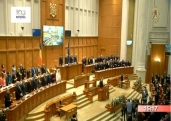The recently proposed fiscal and budgetary measures lead to a decrease in the purchasing power of all citizens and affect the stability or predictability in society, generating a negative social and economic impact on the entire society, which will feel similar effects to the 2010s, shows the Economic and Social Council (CES), which on Friday has given an unfavorable opinion on the fiscal package prepared by the Government.
"The measures imposed, namely the increase in VAT on food, services, and medicines, the increase in excise duties on fuel and the road tax, will lead to an increase in the prices of basic foodstuffs and medicines, and together with the liberalization of electricity and gas prices, the reduction in income for some employees through Government Emergency Ordinance No. 36/2025, all of this will lead to a drastic decline in living standards in a very short time, without any prior preparation of the population, especially vulnerable individuals and families. We believe that the austerity measures should have been approached in stages, over a longer period of time," the Economic and Social Council specifies in its opinion published on Friday.
The Economic and Social Council also notes that, given the complexity of the draft legislation, a detailed and rigorous analysis is necessary, which is impossible to achieve within the insufficient time frame available for its approval.
According to the cited document, the set of measures proposed is socially unbalanced, lacking a compensation mechanism for vulnerable groups and based on a regressive fiscal logic.
"The draft law does not comply with the principles of fairness and progressivity in public policy, shifting the tax burden to low- and middle-income populations. The proposed measures are likely to deepen social inequalities, affect access to essential goods, and reduce the subsistence capacity of vulnerable households. They may also have a destabilising effect on society and fuel social and political tensions in a context already marked by polarisation and institutional mistrust," the CES opinion further states.
The measure to increase the VAT rate from 9% to 11% for several categories of essential products will have an inflationary effect on household spending and will affect access to essential goods, especially for vulnerable social groups, maintains CES. The measure also contravenes European recommendations on protecting vulnerable groups during periods of fiscal adjustment, the cited source shows.
As regards the introduction of health insurance contributions (CASS) for people with pension incomes above 3,000 RON, the CES emphasises that, although a protection ceiling has been introduced, the measure affects pensioners with average incomes who do not benefit from other forms of support and have recurring medical expenses. The impact is particularly significant for pensioners in large cities, where the cost of living is higher, and in the absence of compensatory measures, this contribution amounts to a net reduction in pensions, notes the Economic and Social Council.
On the other hand, the document points out that removing the persons included in national HIV/AIDS and tuberculosis programs from the ranks of those insured without paying contributions poses an epidemiological risk that is far too high in relation to budget savings.
With regard to the increase in VAT on cultural products, the measure affects access to culture, education, and information, especially for young people and people from communities with limited resources, in a context where the level of civic education and functional literacy is already problematic.
Regarding the provision whereby authorising officers grant a monthly food allowance of 347 RON to staff whose monthly salaries are up to 6,000 RON net, the CES considers that the reduction in the threshold affects experienced staff who exceed the threshold of 6,000 RON net without having incomes considered "excessive." "This measure may lead to demotivation and an increased risk of migration to the private or external sector," warns the CES.
"The draft law, in its current form, is not based on a solid analysis of the aggregate social impact, does not contain compensatory protection measures, and does not comply with constitutional principles regarding fiscal equity and social solidarity. A balanced fiscal reform is needed, containing measures for the real protection of vulnerable citizens. Without such corrections, we risk not only a deterioration in living conditions, but also an explosion of institutional mistrust and social radicalisation, with direct consequences for democracy and stability in society," says the Economic and Social Council.
































Comentează